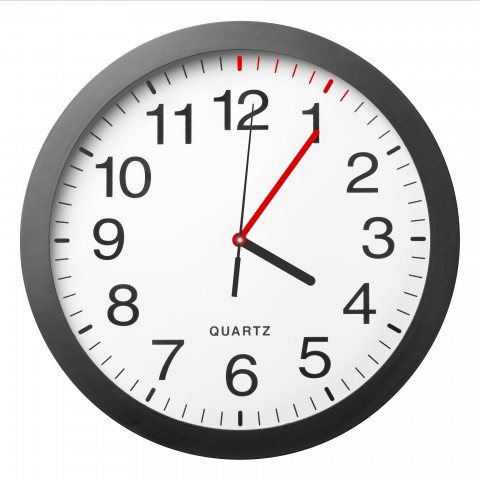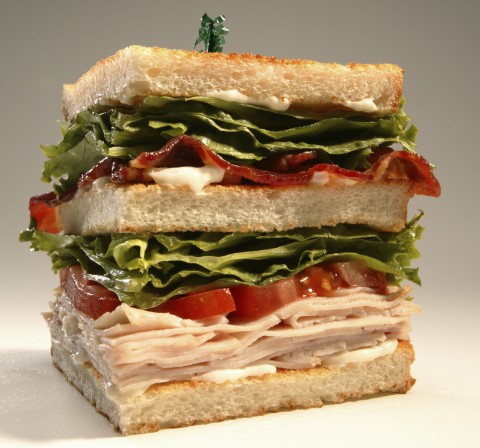Wherever you find yourself in the world, much of your life will be governed by time: What time you wake up, when you need to leave for work, how long your lunch break is, what time the museum opens, making sure you arrive on time for your date. In short, unless you plan on moving to this Norwegian town, you really do need to know how to tell time. 😉
Telling time and making appointments may be easy in your own language and country, but what about when you visit or relocate to the United States? The United States tends to do things differently than the rest of the world, probably just because we can…and in some ways, this applies to telling time.
The good news is that as long as you know your numbers and some basic time-related vocabulary, learning to tell the time in English shouldn’t be too difficult.
Learning to tell the time in English is an invaluable step in your language-learning journey, and something you’ll never regret taking the time to figure out.
 Table of Contents
Table of Contents
- How Do You Ask the Time in English?
- Talking About Hours
- Talking About Minutes
- Hours Divided into Minutes
- How to Describe Time in English with General Time References
- Time Adverbs
- Proverbs About Time in English
- Conclusion: How EnglishClass101 Can Help You Master English
1. How Do You Ask the Time in English?

Before you learn about telling time, you should know how to ask for it. When first arriving in an English-speaking country, you’ll definitely be asking the time more than giving it! Here are some of the most common ways to ask someone what time it is.
- Excuse me, what time is it?
- Do you have the time, please?
- Do you happen to have the time?
- Can you please tell me what time it is?
- Excuse me, please tell me the time.
- What time should I arrive?
- What time is the ___ [meeting, movie, etc.]?
Notice how the first five questions use polite phrases such as “excuse me,” and “please.” While it’s not always necessary to include these polite phrases (especially if you’re in a hurry and need the time right away!), people always appreciate you taking the time to be courteous. 🙂
Now that you’re familiar with asking about time in English, how do you say the time in English?
2. Talking About Hours
When telling time in American English, the majority of people go by the twelve-hour clock, though some are familiar with the twenty-four-hour clock (also called the Military Clock) as well. In this article, I’ll only be covering the twelve-hour format as this is the most widely used time format in the United States, and will help you learn how to tell time in English more than going over the 24-hour clock.

1- Twelve-Hour Clock Time
Before looking at the chart below, please note that in the United States, we sometimes add “o’clock” to the end of a time. This is considered a more formal and proper way of telling time, but more often than not, people drop the word “o’clock” and just say the number. In the chart, I wrote the example sentences both ways so that you can hear the difference yourself.
| Time | Usage in a Sentence |
|---|---|
| 1 o’clock [a.m. / p.m.] | The softball game starts at 1 o’clock. OR The softball game starts at 1. |
| 2 o’clock [a.m. / p.m.] | Let’s meet at 2 o’clock. OR Let’s meet at 2. |
| 3 o’clock [a.m. / p.m.] | The cafe closes at 3 o’clock. OR The cafe closes at 3. |
| 4 o’clock [a.m. / p.m.] | Gerta left home at 4 o’clock. OR Gerta left home at 4. |
| 5 o’clock [a.m. / p.m.] | It’s 5 o’clock. OR It’s 5. |
| 6 o’clock [a.m. / p.m.] | Dinner will be ready at 6 o’clock. OR Dinner will be ready at 6. |
| 7 o’clock [a.m. / p.m.] | We should leave at 7 o’clock. OR We should leave at 7. |
| 8 o’clock [a.m. / p.m.] | She ate breakfast at 8 o’clock. OR She ate breakfast at 8. |
| 9 o’clock [a.m. / p.m.] | At 9 o’clock, the telephone rang. OR At 9, the telephone rang. |
| 10 o’clock [a.m. / p.m.] | 10 o’clock just came and went. In this example, using only “10” would sound a bit odd, so adding “o’clock” is the best way to say this sentence. |
| 11 o’clock [a.m. / p.m.] | Rita was already hungry at 11 o’clock. OR Rita was already hungry at 11. |
| 12 o’clock [a.m. / p.m.] | Let’s get ice cream at 12 o’clock. OR Let’s get ice cream at 12. |
A.m. vs. P.m.
Because we use the twelve-hour clock format, it’s important that we have a way to know which set of twelve hours we’re talking about. (Otherwise, we would all be heading to meetings and dates twelve hours late or early!)
In the U.S., we do this by using “a.m.” (short for the Latin phrase ante meridiem, referring to any time before midday / noon) and “p.m.” (short for the Latin phrase post meridiem, referring to any time after midday / noon). These initials are put directly after the time whenever clarification is needed (so that you go get ice cream at midday and not midnight, unless that’s your thing). Here are some examples:
- 2 o’clock p.m. (afternoon)
- 7 o’clock a.m. (morning)
- 6 o’clock p.m. (evening)
- 9 o’clock a.m. (morning)
Keep in mind that 12 o’clock a.m. is midnight, and 12 o’clock p.m. is midday—these are the most commonly confused times for those just learning this time format.
This may sound confusing and unnecessarily difficult if you aren’t used to telling the time this way, but once you get the hang of it, it isn’t so bad. 😉
3. Talking About Minutes

An hour is made up of sixty “minutes,” and in the U.S., we give the exact time by saying the hour and then the minutes. Minutes, here, refer to how many minutes after the hour it is. In writing, this is written with the number of the hour followed by a colon, and then the number of minutes after the colon: [Hour]: [Minutes After].
For example, this may look like:
- 1:34 (thirty-four minutes after one o’clock)
- It’s 1:34 a.m., what are you doing up?
- 3:16 (sixteen minutes after three o’clock)
- At 3:16 p.m., she finally left the hospital.
- 8:59 (fifty-nine minutes after eight o’clock, or one minute before 9 o’clock)
- It was 8:59 a.m. when she looked at the clock.
4. Hours Divided into Minutes

There are three common terms that we use to divide the hours into minutes in a simpler fashion: “quarter,” “third,” and “half.” This makes it much easier to quickly give someone the approximate time.
1- Quarter
In regards to time, people use the word “quarter” to represent 15 minutes (which is 1/4 of an hour, just as a quarter in U.S. money is 1/4 of a dollar). We use the phrase “quarter past” to say “fifteen minutes after” and “quarter to” to say “fifteen minutes until [or before].”
Here are some examples of this, with the time each one represents in parentheses:
- Quarter past 5 (5:15)
- Be ready for dinner at a quarter past 5.
- Quarter past 9 (9:15)
- The bus arrived at a quarter past 9.
- Quarter to 4 (3:45)
- She left work at a quarter to 4.
- Quarter to 7 (6:45)
- It was a quarter to 7, and Steve still hadn’t shown up.
2- Third
“Third” is not a common term used for time in the United States, but in case you do hear it used, it refers to 20 minutes (because 20 is 1/3 of 60). So “a third past” refers to twenty minutes after the hour, and “a third to” refers to twenty minutes before the hour.
- A third past 1 (1:20)
- Be there a third past 1.
- A third past 5 (5:20)
- They finished dinner at a third past 5.
- A third to 9 (8:40)
- She left the house at a third to 9.
- A third to 12 (11:40)
- At a third to 12, she stopped for lunch.

Honestly, you don’t need to worry too much about this one, as it’s rarely used and doesn’t sound as natural as “quarter” and “half” in conversation.
3- Half
“Half” is a very common phrase you’ll hear when people talk about time in English. “Half” refers to 30 minutes, as that’s half an hour (“half an hour” or “half-hour” are phrases you’ll also hear often, simply meaning 30 minutes). As with the word “quarter,” people use the phrases “half past” and “half an hour to” to describe 30 minutes after or until an hour, respectively.
- Half past 3 (3:30)
- Meet me at half past 3.
- Half past 7 (7:30)
- Bill woke up at half past 7.
- Half an hour to 6 (5:30)
- Quinton showed up half an hour to 6.
- Half an hour to 10 (9:30)
- Sue took her shower at half an hour to 10.
This is probably the easiest term to remember, as the time will always have a “thirty” in it. But be careful to always pay attention to the words “past” or “to.” Mixing these up can result in disaster!
5. How to Describe Time in English with General Time References
Knowing exact numeric times is important, but it’ll only get you so far. People in the United States often tell the time using general references, seeing as this is much faster and simpler when an exact time isn’t needed. Here’s a quick chart of the most commonly used references with their meanings and example sentences.

| Meaning | Usage in a Sentence | |
|---|---|---|
| Early Morning | “Early morning” refers to the very first hours of the day, and there is no specific time frame that this represents. However, “early morning” typically refers to anywhere from 3am to 9am, depending on who you ask. | Susan eats breakfast in the early morning after she wakes up. |
| Sunrise / Dawn | “Sunrise” and “Dawn” refer to the same time of day, which is whenever the sun happens to begin rising above the horizon. When “sunrise / dawn” occurs varies over the course of a year, occurring earlier in summer and later in winter. | The birds started singing at sunrise. Alex woke up right at dawn. |
| Noon / Midday | “Noon” and “Midday” refer to the same time of day, which is 12:00pm, or the very middle of a twenty-four-hour day. This is often around the time people have their lunch. | “Can we talk again at noon?” Tom asked her. Lillian always ate lunch around midday. |
| Early Afternoon | “Early afternoon” refers to approximately two to four hours after noon (from noon to about 2pm or as late as 4pm). | Vance enjoys walking in the early afternoon. |
| Late Afternoon | “Late afternoon” refers to approximately four to seven hours after noon (from about 4pm to 7pm). | They enjoyed a nice barbeque meal in the late afternoon. |
| Evening | “Evening” is just before sunset or nightfall. This usually refers to the time period from 7pm to 8pm, though this can vary over the course of a year, with evening being earlier in winter months and later in summer months. | She stayed out late that evening with her friends. |
| Sunset / Dusk | “Sunset” and “Dusk” refer to the same time of day, which is when the sun begins to set below the horizon. This is before nightfall, but no longer considered daytime. | Wendy and Rick watched the beautiful sunset together. At dusk the sky sometimes turns purple. |
| Night | “Night” refers to after the sun has set, and it’s dark outside. Depending on who you ask, it usually refers to any time after 8pm until sunrise the next day. | Kyle didn’t get any sleep yesterday night. |
| Midnight | “Midnight” refers to 12:00am, or the very middle of the night. | Ira woke up at midnight feeling very hungry. |

6. Time Adverbs
Adverbs are not the most fun thing to study, but in telling time, they are essential. With the adverbs I cover in this section, you can learn to tell time in a more general, easy-going way, and in a way that everyone will understand. But instead of telling the time, these adverbs describe the time.
1- Adverbs that Talk About the Present
These time adverbs all talk about something that is happening in the present time.
| Usage in a Sentence | Additional Information | |
|---|---|---|
| Right now | “Come over here, right now!” his mother said. | |
| Currently | I’m currently drinking a cup of coffee. | |
| At the moment | At the moment, Olive doesn’t know what to do. | |
| Meanwhile | Meanwhile, the tow truck took Al’s car away. | Note that “meanwhile” is different from the other words. Instead of simply talking about the present, it describes when something happens in the present, in relation to another action. For example, suppose Al went to a restaurant to eat but parked somewhere he shouldn’t have. The sentence would read: “Al enjoyed a burger at the restaurant. Meanwhile, the tow truck took Al’s car away.” |
| At the same time | They both started laughing at the same time. | “At the same time” means roughly the same thing as “meanwhile,” but it’s used a little bit differently. It normally refers to two actions or events that occur simultaneously. |
2- Adverbs that Place the Time
These time adverbs work to answer the questions: “When?” or “How long?” in terms of the current time.

| Meaning | Usage in a Sentence | Additional Notes | |
|---|---|---|---|
| Before | “Before” means previous to or prior to. | “Before I get started, I have a question,” the motivational speaker said. | This sentence indicates that the speaker will get started, but not until he’s asked a question. |
| After | “After” means later or at the end of something else. It’s the opposite of “before.” | After a long day, Sara spent the evening watching TV. | This sentence suggests that a long day has passed, and once it was over, Sara watched TV. |
| Soon | “Soon” means in the near future. | Henry was leaving for college soon. | This sentence suggests that Henry will leave for college not long from now. This could be hours or even a couple of months, as “soon” is a very vague and subjective term, and often depends on context. |
| Almost | “Almost” is similar to “soon,” and means nearly. | “It’s almost time!” he said excitedly. | The man in this sentence is excited because something he is looking forward to is happening soon. |
| In a little while | “In a little while” means that something will happen after a certain period of time, but it won’t be long. | I’ll be going to the store in a little while. | This is another vague term. In this sentence, the speaker is going to the store after an unspecified period of time has passed. In the case of something like going to the store, it probably refers to minutes or hours. |
| Not long after | “Not long after” is similar to “in a little while,” but gives a more specific idea of what will happen (or has happened) at the time being talked about. | Not long after watching a horror movie, Val thought she heard noises. | In this sentence, the thing that happened is Val watching a horror movie. Soon after, she thought she heard noises. |
| Later | “Later” is similar to “after,” but is a more general reference to a future time. | “Do you want to go out for dinner later?” Joe asked. | In this sentence, Joe hasn’t specified what time he wants to have dinner. But based on the context, it probably means a few hours from the current time, and a more specific time will be set up if the answer is yes. |
| For a long time | “For a long time” can essentially mean different things, but refers to much time passing or having passed. | “I haven’t been this depressed for a long time,” said Jane. OR “You were at the store for a long time,” said Uriel. | The first sentence suggests that Jane used to be that depressed but much time has passed since then. In the second sentence, Uriel is telling someone that they took a long time at the store. |
| Anytime | “Anytime” is a word that’s used when one isn’t picky or specific about a time. It means that any time is okay, or that something can happen at any time. | “You can stop by anytime,” said Liz. | In this sentence, Liz is okay with the person she’s talking to visiting her at any time. |
| As soon as possible | “As soon as possible” (often abbreviated to “ASAP”) means that something should happen at the earliest possible convenience. | “Come to the front office as soon as possible,” the announcement said. | In this sentence, the announcement wants someone to come to the office quickly, whenever they’re first able to. |
| In the near future | “In the near future” is a more formal, long-winded way of saying “soon.” It’s often used when talking about larger projects or events. | The sign read: “We hope to have this park reopened in the near future.” | In this sentence, the sign indicates the park will hopefully be open again soon. |
7. Proverbs About Time in English
In the United States, there are several proverbs and sayings related to time. In this section, I’ll only go over the most common idioms related to time in English, but these should give you a pretty good foundation.
- Time is money.
- When someone says “time is money,” they’re referring to the fact that the more time you work, the more money you’ll make. Working hard means more money.
- Time flies.
- When someone says “time flies,” they mean that time tends to go by quickly. A variation of this phrase is “time flies when you’re having fun,” which means that time goes faster when you’re enjoying how you spend it.
- Time is of the essence.
- This phrase means that time is the most important thing in a situation. People often say this when they need something done quickly.
- An inch of gold will not buy an inch of time.
- This phrase means that time is of greater value than gold or money. No matter how much money you have, you can never get back your time, so it’s important to use your time wisely and not be too focused on using it for work. A variation of this phrase is “time is more precious than gold.”
- Time heals all wounds.
- This phrase means that when someone’s been hurt (either physically or emotionally), it will get better with time. A variation of this phrase is “time heals most wounds,” which suggests that some wounds never heal at all, or require more than time to heal.

- You can’t stop time.
- When someone says that you can’t stop time, it means that time always continues and there’s no way of getting around it.
- Ahead of one’s time.
- If someone is “ahead of their time,” it means that they’re a forward-thinking individual, and wise.
- Behind the times.
- On the other hand, if someone is “behind the times,” it means that they’re still living in the past, or not adapted to life’s changes as time goes on. This is often used in a negative sense.
- Time of your life.
- If someone has the “time of their life,” it means they’re having a lot of fun or that a lot of good things are happening to them. This phrase suggests that it’s the best time of their life.
- Live on borrowed time.
- The phrase “live on borrowed time” means that everyone “lives on borrowed time,” in that we should consider our time precious because it doesn’t really belong to us, but was rather given to us. (You wouldn’t spend borrowed money on silly things, or be reckless with a borrowed object, would you?)
- At the eleventh hour.
- “At the eleventh hour,” refers to the latest time at which something can or will happen. A similar phrase is “at the last minute.”
- Beat the clock.
- When someone “beats the clock” it means that they’ve done something just in time, before it was too late.
- Around the clock.
- If someone does something “around the clock” it means that they never stop, and are always doing it.
- 24/7.
- “24/7” means about the same thing as “around the clock.” If someone does something 24/7, they’re always doing it. “24/7” is short for “twenty-four hours a day, seven days a week.”
- It’s about time.
- Someone usually says “it’s about time” when they’ve been waiting for something to happen and it finally does. It’s usually said in a joking or impatient manner.
8. Conclusion: How EnglishClass101 Can Help You Master English

So, reader, do you understand how to tell time in English better now? Is there anything about telling time you’re still struggling with or don’t understand? Let us know in the comments, and we’ll be glad to help!
This article covered a lot of information about telling time in U.S. English, and it’s expected that you’ll need to go over some of this information again to fully process it. You’re a trooper for making it this far, and I hope you feel a little more comfortable telling the time now!
Keep in mind that when learning about telling time in English, practice is key. Practice as much as you can, and you won’t regret it.
As you continue to learn to tell time, you may also find it handy to check out my article on dates in U.S. English—you’ll be using time and dates together quite often, after all!
EnglishClass101.com has many more learning tools for you, including insightful blog posts on an array of topics and free English vocabulary lists for you to study. For a more personalized, one-on-one approach to learning English, you can also upgrade to Premium Plus to take advantage of our MyTeacher program!
English is one of the most difficult languages to learn, so the fact that you’ve come this far shows your determination and ability. Know that you can master English, and EnglishClass101 will be with you at each step of your journey!










